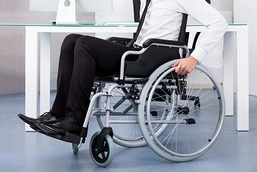Quarter of disabled voters found General Election polling stations inaccessible
Almost a quarter (24 per cent) of disabled people found it difficult to vote in person at polling stations at the General Election on 7 May, according to research by leading UK charity Leonard Cheshire Disability.

The charity found that people faced a wide range of problems, including having no level access into polling stations, a lack of disabled parking spaces, and inaccessible voting booths and ballot boxes. Some disabled people did not have access to large print ballot papers, and many of those who experienced difficulty told the charity that polling station staff were not helpful in resolving the issues they experienced.
These findings come despite Electoral Commission guidance to councils in 2011 that polling stations should have these accessibility features, and disabled voters must not be offered a lower standard of service than other voters.
The campaigns director at Leonard Cheshire Disability, Andy Cole, said: “The government estimates that nearly 11m disabled people are eligible to vote, and we need to ensure every single person has the chance to make their voice heard by making all polling stations and postal votes accessible.
“We were very pleased to find that the majority disabled people found voting easy at this election. However, we’re calling on councils to meet the accessibility criteria set out by the Electoral Commission – which includes level access into and inside the polling station, large print ballot papers and fully trained staff. This will prevent the difficulty and frustration that many disabled people still currently face when voting.
“We urge councils to seek the views of disabled people and fully include them in the process of improving voting accessibility in their areas – for example, hearing loops in polling stations are not mandatory at the moment, but they should be.”
Among other issues highlighted in the research were voters who were not able to access a hearing loop.
From 344 responses in the survey, some disabled voters shared their experiences of voting at the election. One disabled voter said: “There was a step up into the venue. My wheelchair could not be tipped back far enough to get over the step. The staff did offer to come and help lift me over, which although was kind it wouldn't have been helpful or dignified at all, plus I was fearful of being dropped.”
Another disabled voter said: “The booth shelf was too high so I had to complete the ballot papers on my lap for all to see. There was no privacy.”
The charity’s research also found that more than one in six (17 per cent) found it difficult to vote by post. A postal voter said: “The print was too small for me to read and the instructions confusing. I couldn't have managed without help which is disappointing.”
In advance of the 2016 elections, Leonard Cheshire Disability is calling for a review into the accessibility of polling stations and the postal form to make it easier for disabled people to cast their vote.
Latest News
 29-Jul-24
Dementia Bus gives carehome.co.uk staff insight into life with dementia
29-Jul-24
Dementia Bus gives carehome.co.uk staff insight into life with dementia
 27-Jul-23
UK's top home care agencies in 2023 revealed
27-Jul-23
UK's top home care agencies in 2023 revealed
 30-Nov-22
A quarter of older people keep their falls secret from family
30-Nov-22
A quarter of older people keep their falls secret from family
 29-Nov-22
'Covid-19 has not gone away' say terminally ill
29-Nov-22
'Covid-19 has not gone away' say terminally ill
 28-Nov-22
IT consultant who received poor care opens 'compassionate' home care business
28-Nov-22
IT consultant who received poor care opens 'compassionate' home care business